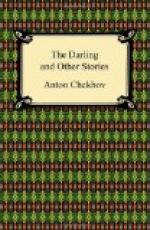“You contradict yourself, though,” said Lida. “You talk about science, and are yourself opposed to elementary education.”
“Elementary education when a man has nothing to read but the signs on public houses and sometimes books which he cannot understand— such education has existed among us since the times of Rurik; Gogol’s Petrushka has been reading for ever so long, yet as the village was in the days of Rurik so it has remained. What is needed is not elementary education, but freedom for a wide development of spiritual capacities. What are wanted are not schools, but universities.”
“You are opposed to medicine, too.”
“Yes. It would be necessary only for the study of diseases as natural phenomena, and not for the cure of them. If one must cure, it should not be diseases, but the causes of them. Remove the principal cause —physical labour, and then there will be no disease. I don’t believe in a science that cures disease,” I went on excitedly. “When science and art are real, they aim not at temporary private ends, but at eternal and universal—they seek for truth and the meaning of life, they seek for God, for the soul, and when they are tied down to the needs and evils of the day, to dispensaries and libraries, they only complicate and hamper life. We have plenty of doctors, chemists, lawyers, plenty of people can read and write, but we are quite without biologists, mathematicians, philosophers, poets. The whole of our intelligence, the whole of our spiritual energy, is spent on satisfying temporary, passing needs. Scientific men, writers, artists, are hard at work; thanks to them, the conveniences of life are multiplied from day to day. Our physical demands increase, yet truth is still a long way off, and man still remains the most rapacious and dirty animal; everything is tending to the degeneration of the majority of mankind, and the loss forever of all fitness for life. In such conditions an artist’s work has no meaning, and the more talented he is, the stranger and the more unintelligible is his position, as when one looks into it, it is evident that he is working for the amusement of a rapacious and unclean animal, and is supporting the existing order. And I don’t care to work and I won’t work. . . . Nothing is any use; let the earth sink to perdition!”




